COMMENT
No, you’re not crazy. Yes, they claimed the vaccines would prevent transmission.
One of the most bizarre lies being told this week in response to Pfizer executive Janine Small’s testimony to EU Parliament is that, actually, the Covid vaccines were never supposed to stop the spread of the virus.
Asked by Dutch MEP Rob Roos whether the company had tested its vaccine on “stopping the transmission of the virus” before it rolled out globally, Ms Small said “no” because “we had to really move at the speed of science to really understand what is taking place in the market”.
“And from that point of view we had to do everything at risk,” she said.
In a viral Twitter video which has now been viewed more than 12 million times, Mr Roos described the response as “scandalous”, arguing “millions of people worldwide felt compelled to get vaccinated because of the myth that ‘you do it for others’”.
Mr Roos said the admission removed the entire basis for vaccine mandates and passports which “led to massive institutional discrimination as people lost access to essential parts of society”.
“I find this to be shocking, even criminal,” he said.
Of course, fact checkers were not happy.
-ADVERTISEMENT-
This is not the bombshell it is being presented as, they argue, because it was public knowledge that the primary outcome measured in Pfizer’s clinical trials was reducing risk of disease, but not transmission.
Moreover, as the Therapeutic Goods Administration stressed, “transmission effects” are “not an approved indication of any Covid-19 vaccine” currently available in Australia.
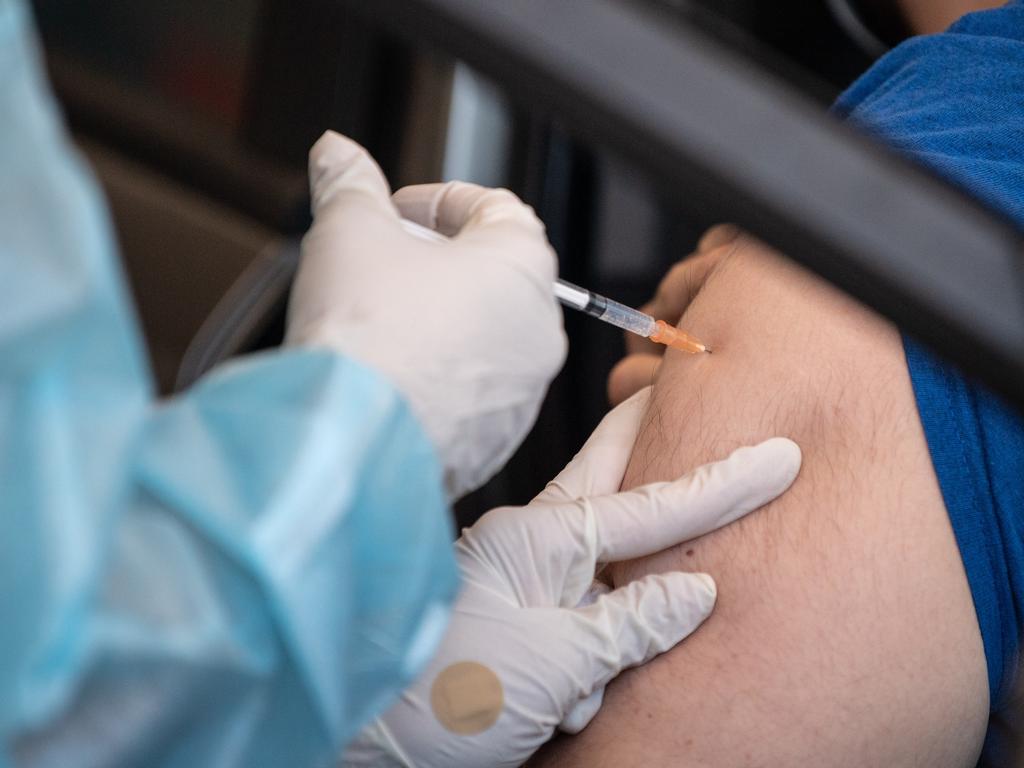
A drive-through Covid vaccination hub in Sydney. Picture: James Gourley/NCA NewsWire
That might be technically true, but it feels like just that — a technicality.
And this is why Mr Roos’ video, while not strictly being new information, struck such a nerve.
Because setting aside what it says in the fine print, the public was told repeatedly, for months, both explicitly and implicitly, that the vaccines would prevent transmission.
They’re all on tape saying it.
US President Joe Biden, for example, said in July 2021 that “you’re not going to get Covid if you have these vaccinations”.
White House chief medical adviser Dr Anthony Fauci said in May 2021 that vaccinated people become “dead ends” for the virus.
CDC director Rochelle Walensky said in March 2021 that “vaccinated people do not carry the virus, don’t get sick”.
In Australia, politicians and health officials held millions of people hostage for months, lecturing and threatening them to get vaccinated to regain their “freedoms”.
The vaccines were the “way out” of the pandemic, they were not to just to protect ourselves but to “protect others”, they would “stop the spread”, and not getting vaccinated was “selfish”.
Vaccine passports, the “vaccinated economy”, were necessary so people who “did the right thing” would feel “safe” knowing they weren’t “mixing” with the unvaccinated, who were a “risk to the community”.
By late 2021 and early 2022, as Omicron became dominant and it was clear vaccinated people were still catching and spreading the virus, the messaging changed.
“Stopping the spread? What are you talking about? It’s about reducing hospitalisation and death. We have always been at war with hospitalisation and death.”
That’s all well and good — but it’s an entirely different moral calculation.
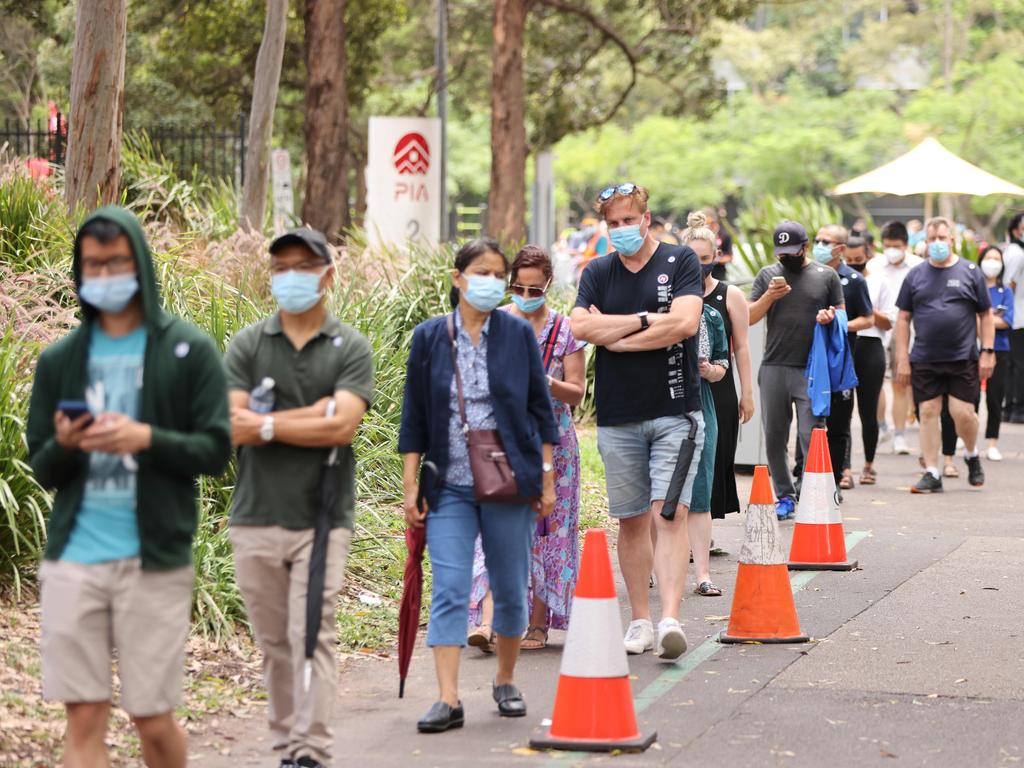
People getting vaccinated to stop the spread. Picture: Damian Shaw/NCA NewsWire
Vaccine mandates, like other Covid restrictions, were always a balancing act between personal choice and public health.
But with the vaccine no longer stopping the spread of the virus, mandates are effectively like the police kicking down your door and forcing you to eat your vegetables at gunpoint.
Or like protecting immunocompromised people by simply welding them inside their homes.
This is not a new argument.
In January this year, Nobel Prize-winning virologist Luc Montagnier and constitutional scholar Jed Rubenfeld argued in The Wall Street Journal that, in the face of the Omicron variant, the Biden administration’s vaccine mandates were obsolete.
“It would be irrational, legally indefensible and contrary to the public interest for government to mandate vaccines absent any evidence that the vaccines are effective in stopping the spread of the pathogen they target,” they wrote.
“Mandating a vaccine to stop the spread of a disease requires evidence that the vaccines will prevent infection or transmission (rather than efficacy against severe outcomes like hospitalisation or death).”
Even the World Health Organisation, as far back as April 2021, cautioned that “if mandatory vaccination is considered necessary to interrupt transmission chains and prevent harm to others, there should be sufficient evidence that the vaccine is efficacious in preventing serious infection and/or transmission”.
At that time, evidence was still emerging about the vaccines’ ability to stop transmission of the original strain of the virus — and besides, as everyone now tells us, that was never the primary goal, but merely a nice added bonus.
And yet mandates were introduced anyway.
Yes, politicians and health officials have changed their tune and no longer talk about vaccines stopping transmission.
Yes, newer strains of the virus changed the situation.
But it’s insane to claim, as many now try to, that they never did in the first place.
Below is just some of what they said.
A simple “sorry, we were wrong” would go a long way.
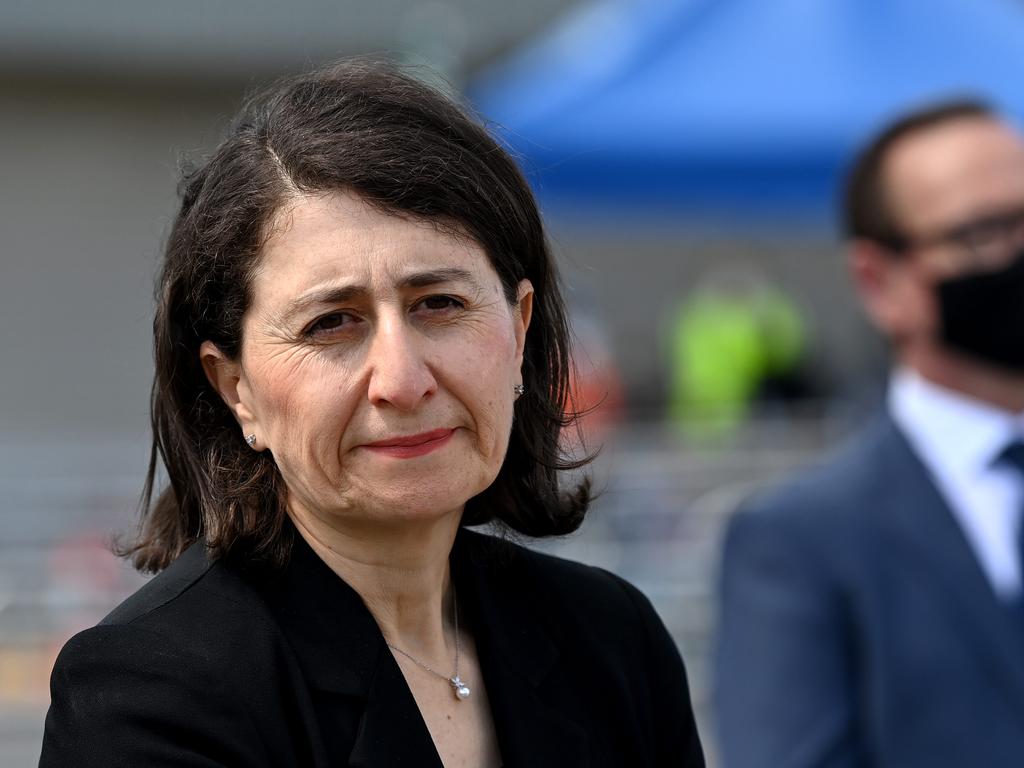
Former NSW Premier Gladys Berejiklian. Picture: Bianca De Marchi/NCA NewsWire
Gladys Berejiklian
August 25, 2021: “Don’t hold off, get your hands on any vaccine you can. Keep yourself [and] your loved ones safe. It’s also doing a community service by helping stop the spread and keeping people out of hospital. The quicker we are vaccinated, the quicker we will get to the next target.”
September 2, 2021: “Anybody should come forward and get vaccinated. We don’t want to see anybody vulnerable without vaccine. This is I’ve said a couple of times a pandemic, an epidemic of the unvaccinated. When we see people who are fully vaccinated hospitalised or horribly die, often there are other conditions associated with that.”
September 7, 2021: “I wouldn’t want to be in the room with lots of people who aren’t vaccinated. And I certainly hope that all of our colleagues [parliamentarians] are vaccinated. That’s the message we’ve been sending the community. And obviously as workplaces open up, every workplace will have their policies according to what the government is indicating. But I just want to make this point very clear — if people want to enjoy the things we have missed such as a meal or … any other venue, they’re going to have to be vaccinated.”
September 13, 2021: “I don’t want people to think they can sit back and let everybody else do the hard work [getting vaccinated]. We all have choices and if it’s your choice not to be vaccinated, well that might mean you cannot participate in things that [the] fully vaccinated do.”
September 15, 2021: “We don’t want anyone who hasn’t been vaccinated yet to sit at home. Come out, get vaccinated, do your bit for yourself and your family. Remember that people might say well if you’re not vaccinated, that’s on you and you might get sick — well, no. Unvaccinated people spread the disease more readily. So if you’re in a venue or somewhere and there’s unvaccinated people [you have] more chance of contracting the disease from them because they don’t have that protection.”
September 20, 2021: “I just want people to acknowledge that because unvaccinated people … it’s one thing to put themselves in jeopardy, but they’re jeopardising everybody else because they’re more contagious. If you choose not to be vaccinated, it’s one thing to make that decision for yourself and your family, but you’re also making that decision, suggesting that you don’t care if you’re more contagious to other people. [People choosing not to be vaccinated] means all of us have to be on guard, because as Dr Chant and myself and everybody’s been saying, even if you’re double vaccinated and have underlying health conditions you can still be at risk. I worry for people like my parents or others in the community who are aged or fully vaccinated, but yet could still be vulnerable.”
September 27, 2021: “It is not too late. You have the option, go today, make your booking and get vaccinated not only to protect yourself and your loved ones but also the community.”
Brad Hazzard
July 29, 2021: “There are a lot of people who don’t base their decisions in science or evidence. I’d say to those … not wanting to take vaccines, my message to them is you’re being extremely selfish if you think you can not have a vaccine just because you don’t want to have a vaccine, well you should think about what you’re doing to your family and to the community, and I would say even more than that, what a hide you have, what a ridiculous position is that when you’re going to put health staff at risk, and when you get sick you’re going to expect to come into hospital and get paid for by taxpayers.”
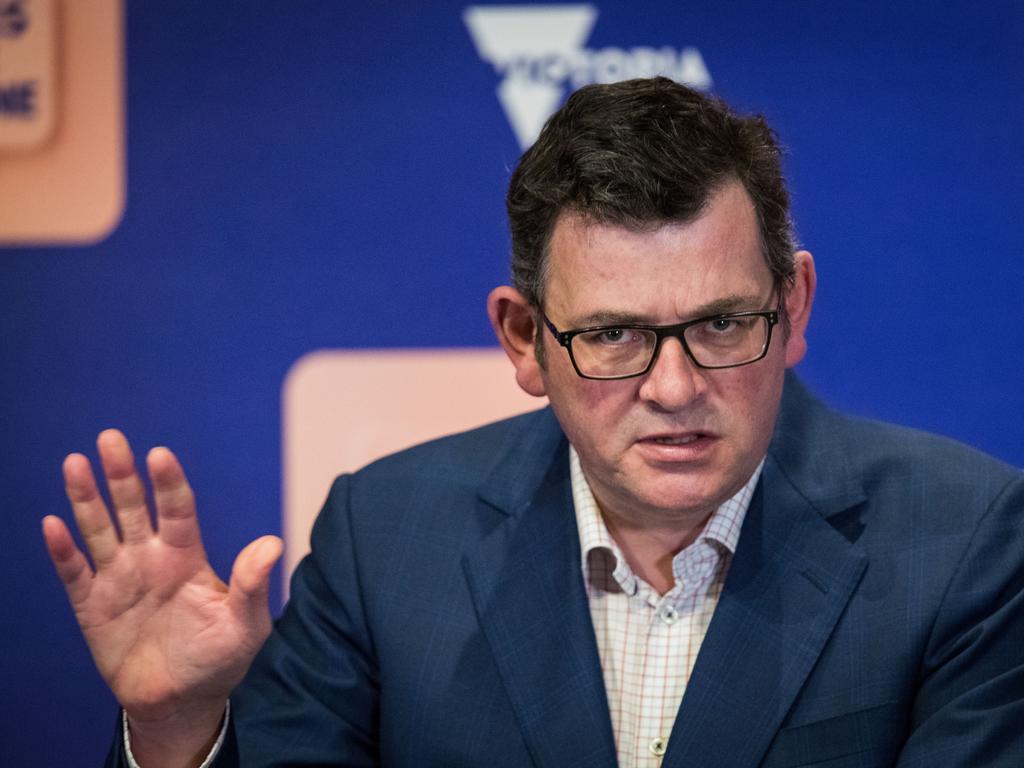
Victorian Premier Daniel Andrews. Picture: Darrian Traynor/Getty Images
Daniel Andrews
September 5, 2021: “We’re going to move to a situation where, to protect the health system, we’re going to lock out people who are not vaccinated and can be. If you’re making the choice not to get vaccinated, then you’re making the wrong choice, you’re making the wrong choice. And for safety’s sake, back to that point of how much work our nurses have to do, as this becomes absolutely a pandemic of the unvaccinated, and we open everything up, it’s not going to be safe for people who are not vaccinated to be roaming around the place spreading the virus. That’s what they’ll be doing.”
September 22, 2021: “There’ll be announcements [about vaccine mandates] made based on the very detailed consideration and determinations of the chief health officer. I wish I could just do a whole blanket list but he has to go through a process so that it’s properly, legally done. So it’s not about people unfairly picking on the construction sector — that’s where the cases are so that explains the required vaccine decision. Then there are other industries where we can get ahead of cases and prevent the spread of coronavirus.”
October 19, 2021: “I’m not going to say to someone, just wait us out … just wait for five weeks and then you will be able to go to the pub. No, if you make the judgement to not get vaccinated and you reckon you can wait us out or the publican or whoever you want to think you are waiting out — you won’t outwait the virus. Because the virus will be here for a long time and your only protection against it is being vaccinated.”
October 26, 2021: “If you’re on the fence, if you haven’t quite made up your mind yet about whether you will or won’t get vaccinated and be protected by these vaccines that are free, that are safe, that are effective — please reconsider that decision. Two doses of this vaccine is the greatest protection that you can have for your health and the health of those you love and, indeed, the health system.”
January 30, 2022: “I think it’s only a matter of time before the relevant federal agencies confirm that it’s three doses … [that are needed] in order to be protected, not just against really critical illness but to be protected or to minimise the likelihood that you get it and that you give it to the people that you love.”
January 2022: “At the moment two doses are protecting the vast majority of people from serious illness, but it’s only with three doses that you’ll be prevented not just from serious illness but from getting this virus, this Omicron variant, and therefore giving it to others.”
James Merlino
September, 2021: “A requirement for vaccination of teachers will be important to stop the spread and protect our kids.”
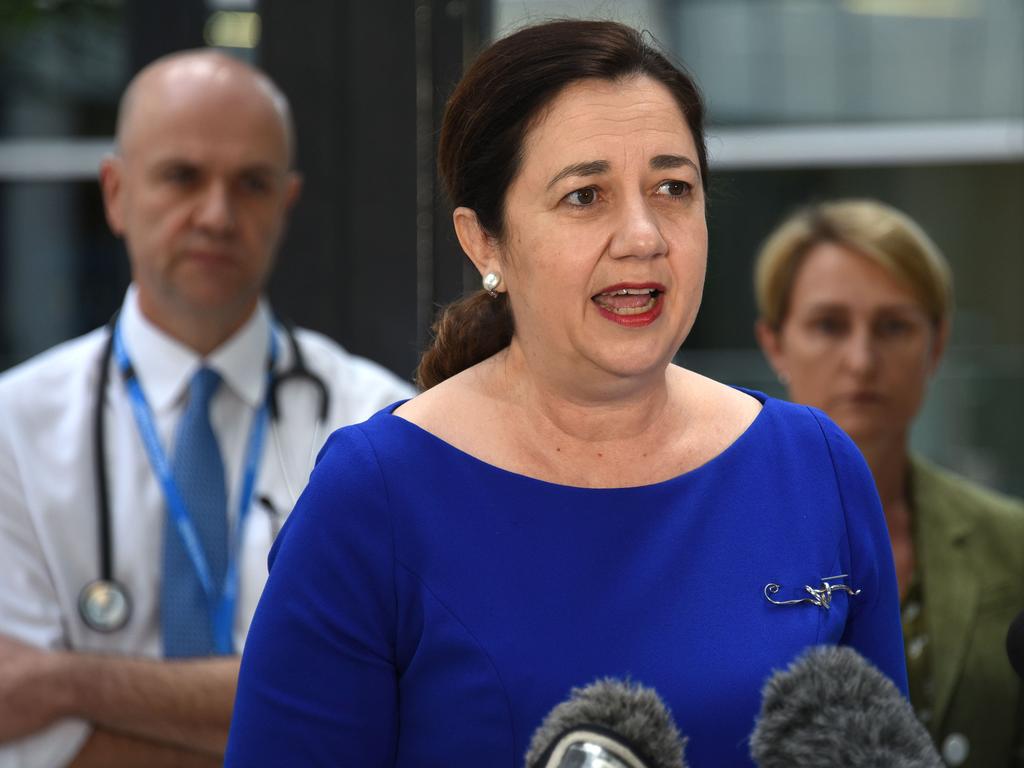
Queensland Premier Annastacia Palaszczuk. Picture: Steve Holland/NCA NewsWire
Annastacia Palaszczuk
November 9, 2021: “People want to be able to go to a music festival, a stadium, a cafe or a restaurant and know the people who are around them are fully vaccinated and it’s safe for their families. This is an important step in keeping our freedoms. Millions of people have gone and got vaccinated and they need to be rewarded for their efforts. They have done a great job, they have done everything I have asked them to do. But as a community, if we are going to stop the spread of this virus when the borders open and the virus is going to come here, we need people to get vaccinated. Families want to know they are safe when they are out in public.”
Jeannette Young
October 7, 2021: “The only thing that’s going to stop us getting locally acquired cases going forward, we know is vaccination. We can’t stop it. The only way to stop it is vaccination. It does take five weeks from your first dose of Pfizer to be fully protected and six weeks from your first dose of Moderna.”
Yvette D’Ath
December 7, 2021: “December 17 is going to be a great day for so many people in Queensland who will get to go out and enjoy the lifestyle that we love so much. They will be able to go there knowing that they’ve done the right thing by getting vaccinated and that they’re walking into a venue where everyone else is vaccinated as well.”
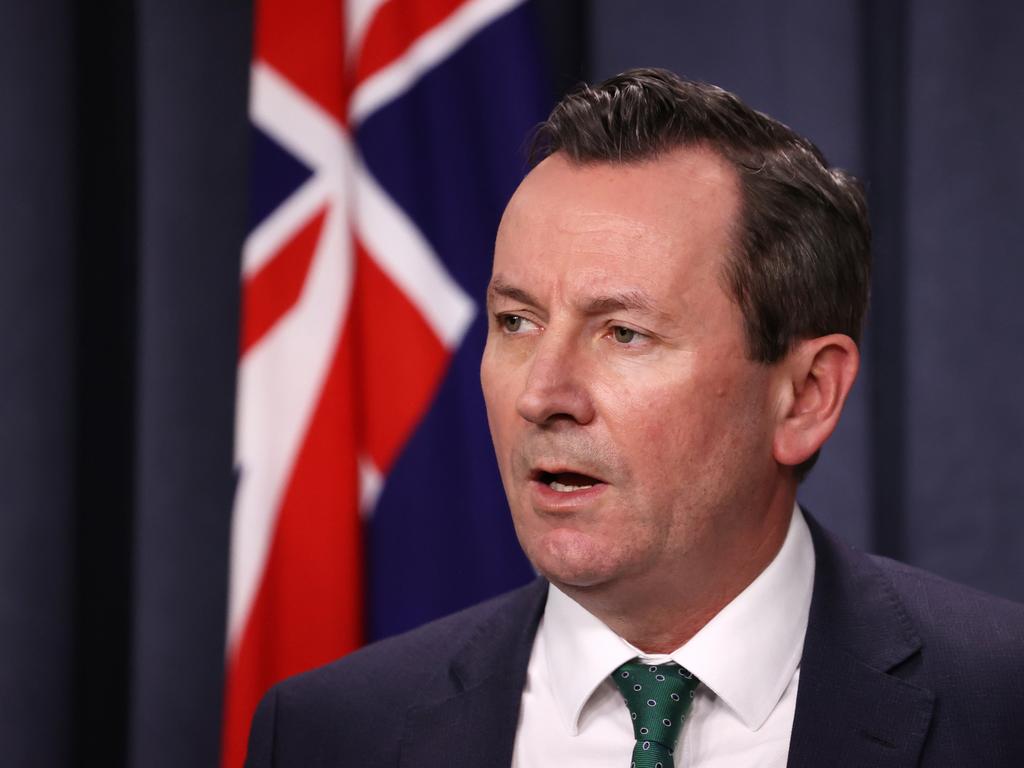
WA Premier Mark McGowan. Picture: Jackson Flindell/The West Australian
Mark McGowan
October 31, 2021: “I just urge these people to go and get vaccinated … the time for protesting and reading crazy conspiracy theorists online is over … Some of the material they’re spreading is extreme, misleading and frankly lies. [They should] get on with life, like everyone else. They are reading wacky theories online that are untrue. This rubbish that’s put out online and some of the lies and misleading information … is dangerous. I just urge them to stop, go and get vaccinated and just act like normal, rational human beings.”
January 13, 2022: “Following WA’s Safe Transition, we want the public to be confident in these public settings, and that they’re only mixing with other vaccinated people. People less likely to be carrying or able to pass on the disease. It reduces the risks posed by unvaccinated people bringing the virus into busy, populated settings. Life will become very difficult for the unvaccinated from January 31. No pubs, no bottle shops, no gym, no yoga classes, no gigs, no dancefloors, no hospital or aged care visits. If you go and get vaccinated today you can have your second dose by early February, but if you choose to remain unvaccinated — and at this point, it certainly is your choice — you’re choosing to put yourself at risk, you’re choosing to put the people around you at risk and you’re choosing to increase the burden on our health staff.”
Roger Cook
October 20, 2021: “Unvaccinated workers in settings in where exposure is likely can cause tremendous harm. They are a risk to themselves, their colleagues and the community. The danger from Delta is very real. We simply cannot afford the hesitant or complacent infecting those workers who have already been vaccinated.”
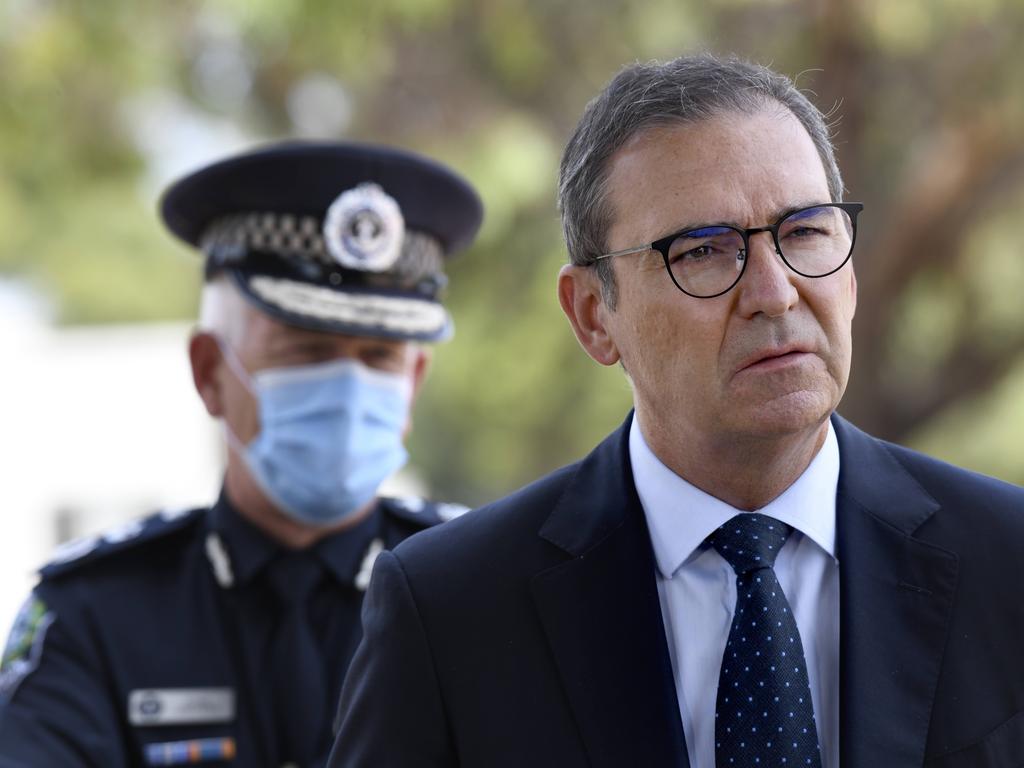
Former SA Premier Steven Marshall. Picture: Naomi Jellicoe/NCA NewsWire
Steven Marshall
May 25, 2021: “This is Kaylah Pascoe — she’s among the first 16 years olds [sic] in regional SA to roll up her sleeve and get a Covid-19 vaccine. Thank you Kaylah. By getting vaccinated, she is not only helping protect herself, but is preventing others from suffering from this insidious disease.”
November 24, 2021: “We’ve had a very, very good uptake in South Australia … They know that when they look interstate at the moment, this is essentially the disease of the unvaccinated.”
December 14, 2021: “There are people who do have legitimate reasons why they can’t be vaccinated. My strong message is that it’s really important to get vaccinated now. We’re going to provide choice but there are increasingly more venues and individuals that don’t want to be out and about with people that are unvaccinated.”
Nicola Spurrier
March 9, 2021: “The vaccines … may not always stop you from catching the virus, but they are very effective at stopping you from getting sick from Covid. Since the initial clinical trials, more than 200 million doses of Covid vaccine have been given worldwide, and the initial data we are seeing is that the vaccine may also be effective at reducing the rate of spread of disease.”
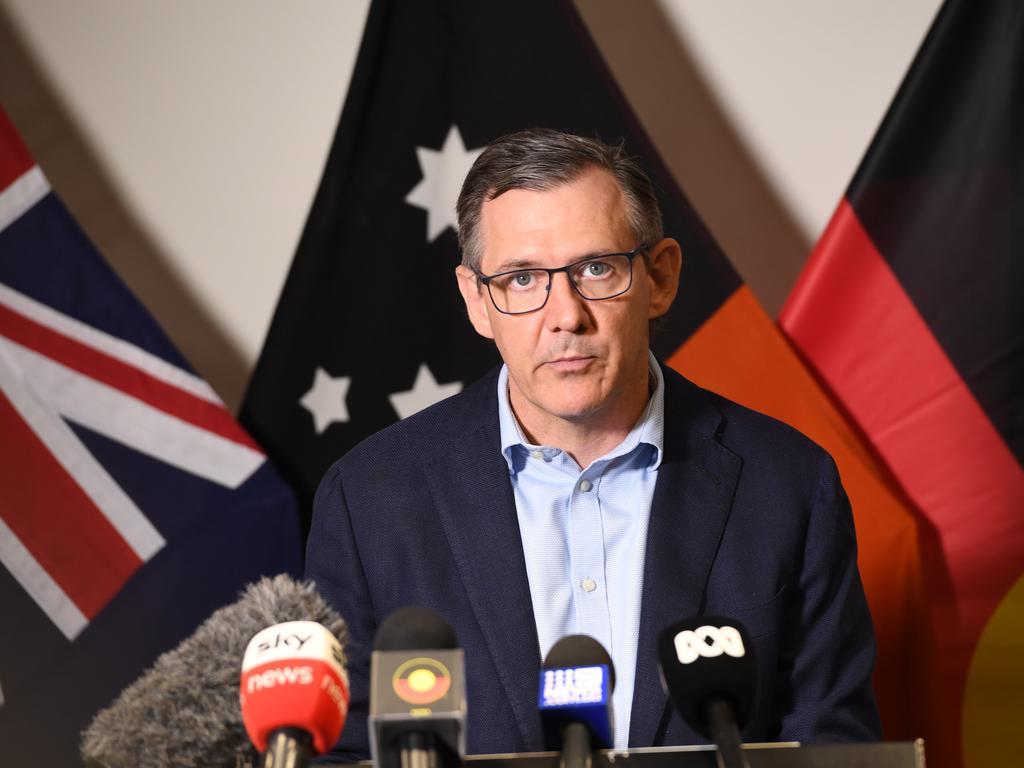
NT Chief Minister Michael Gunner. Picture: Amanda Parkinson
